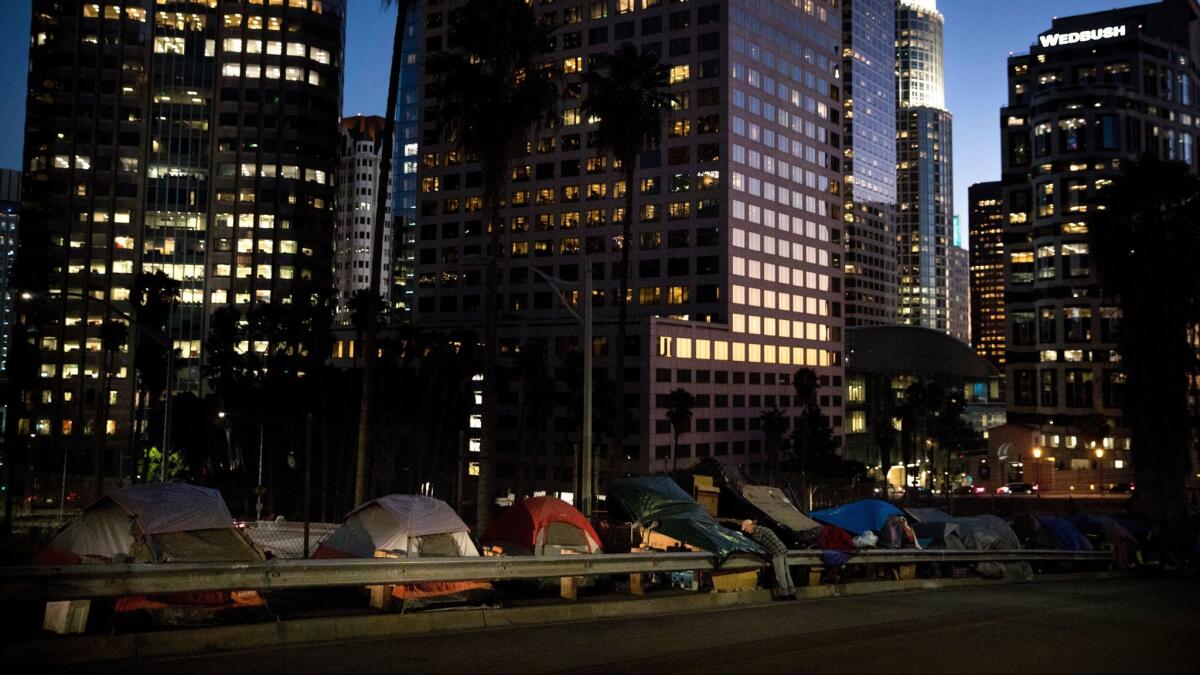Trump isn’t just picking a fight with California liberals, he’s going after conservatives too

- Share via
The Trump administration has seized on homelessness as the latest illustration of the failures of liberal policies. But on closer inspection, it appears to be picking a fight with conservatives in California too.
Tomas Philipson, acting chairman of President Trump’s Council of Economic Advisers, briefed reporters Monday on a new report that the council issued on homelessness in America. Its main conclusions were predictably Trumpian: a slew of state and local regulations needed to be slashed to increase the supply and lower the cost of housing; police should do more to push more homeless people into shelters and services; and high-quality shelters and permanent supportive housing units may actually increase homelessness by providing an attractive alternative to private housing.
On the second point, the courts have barred police from moving homeless people off the streets when there’s a shortage of available shelter beds, and it’s quixotic to believe that cops are going to have an easier time than dedicated outreach workers in persuading homeless people to get treatment or counseling. As for the report’s third point, the implication is that degrading shelters and eliminating permanent supportive housing would magically solve the homelessness problem, which is absurd on its face. The supply of both shelters and PSH units is dictated by the amount of homeless people, not the other way around.
But it’s the report’s first point, about housing regulation, that should raise eyebrows among Republicans and Democrats alike. California’s state and big city governments certainly regulate with the zeal of a hungry lion tearing into a zebra, prompting conservatives and libertarians to view deregulation as a step backward. But the report appears to condemn not just rules that raise construction costs, but also those designed to preserve livability and property values. That scrambles the politics.
To be clear, the report doesn’t lay out a direct course of action for policymakers to follow. Instead, it intones that “overregulation of local housing markets has reduced supply and raised prices, making the cost of a home out of reach for more people.” It goes on to say that “if markets were deregulated,” homelessness would fall by 54% in San Francisco and 40% in Los Angeles, albeit not with Thanos-like alacrity.
What regulations are the problem? The report offers a laundry list: “overly restrictive zoning and growth management controls; rent controls; cumbersome building and rehabilitation codes; excessive energy and water efficiency mandates; unreasonable maximum-density allowances; historic preservation requirements; overly burdensome wetland or environmental regulations; outdated manufactured-housing regulations and restrictions; undue parking requirements; cumbersome and time-consuming permitting and review procedures; tax policies that discourage investment or reinvestment; overly complex labor requirements; and inordinate impact or developer fees.”
Many of those do, in fact, make it costlier to build or expand houses and apartment buildings, and there’s a good argument to be had over whether they should be eased in light of the state’s housing crisis. Others, like energy and water efficiency mandates, add short-term costs in exchange for long-term returns.
But attacking land-use regulations like zoning, density and parking edicts? Good luck selling that notion even in the most conservative parts of the San Fernando Valley. One can only imagine how that would go over if Trump suggested it at his Beverly Hills fundraiser Tuesday night. Homeowners might have no trouble with a proposal to make it easier to build apartment towers and affordable housing projects in someone else’s community, but cramming a bunch of new units with no off-street parking into their neighborhood with its single family zoning? Forget it.
As much as small-government conservatives may like Trump’s approach to regulating business, they and many of their liberal counterparts cherish the notion of local control. And that’s one of the main reasons this state has an excruciating housing shortage. There is a fierce resistance within communities across California to being told to change their look and feel — to become more densely populated, with more renters piled into taller buildings. Hence the state’s failure over the past few decades to come even close to keeping pace with the demand for new housing units.
Gov. Gavin Newsom and some state lawmakers are certainly trying to change this dynamic, as are some local leaders. But progress has been slow, and the efforts to override local control with state edicts have largely been stymied.
Nor does the Trump administration have the authority to do anything about that. The main tools the feds have to address homelessness are the funds they control for housing aid and the services many homeless people need, none of which give them a role in regulations controlling land use and development.
So the president and his appointees can talk as much as they like about California breeding homelessness with big government. But they can’t force deregulation on the state’s housing market. And if they could, the pushback would probably be fierce even from the Republicans in Beverly Hills paying top dollar to see Trump on Tuesday.
More to Read
A cure for the common opinion
Get thought-provoking perspectives with our weekly newsletter.
You may occasionally receive promotional content from the Los Angeles Times.










